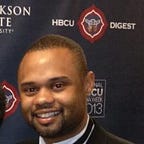Grambling Football is Back. But It Won’t Save the University
Why the Celebration Bowl is just the beginning.
Grambling State University football found a familiar place at the top of the HBCU football mountaintop this past weekend, and with a 10–9 unpretty victory over MEAC challenger North Carolina Central University, took the first steps in shouting from the lofty post about the return of the ‘G’ to the forefront of Black America’s sports conscience.
The university didn’t waste time in capitalizing on the moment as a fundraising opportunity in support of athletics.
Fans are all excited.
Three years ago, all of this would have seemed impossible. The ‘G,’ a football brand constructed by Eddie Robinson and polished with decades of dominance in the SWAC and throughout all of black college football, seemed all but buried in 2013, when a player boycott of a road homecoming game against Jackson State University peeled back the layers on the school’s decimated public appropriations, leadership strife and frustration from students, alumni and other stakeholders. From the New York Times:
Under Gov. Bobby Jindal, Louisiana has been slashing state support for higher education, with funding for Grambling down 56 percent since 2008 (and funding for public colleges in general down 48 percent). In response, the university has laid off more than 120 staff members and reduced the number of degree programs to 47 from 67. It also has deferred maintenance of classroom buildings, dormitories, the library and the football stadium.
Since then Grambling has changed permanent presidents twice, lost its signature undergraduate nursing program, has been partially damaged by flooding, remains without critical facility upgrades and is just starting to rebound from crucial losses in enrollment revenue.
But GSU football is back.
Grambling and president Rick Gallot deserve all of the credit for sticking with Fobbs and finding ways to get him the necessary support in making the Tigers a championship caliber team in just three short years. But even Fobbs, who some Gramblinites believe to be the latest heir to Grambling football’s coaching crown since Doug Williams, would tell you that football is not the engine that drives the university’s success as a community anchor in northern Louisiana, and won’t be the shield of protection from federal and state budget cuts that could further threaten the university’s survival.
We need to be clear about this: 11 wins and a Celebration Bowl victory has earned Grambling the right to ask its stakeholders to help buy the team championship rings. Institutionally, what kind of performance has Grambling’s academic, philanthropic and legislative lobbying divisions delivered to make the university a desirable investment?
People can see team records and they can see a scoreboard. They can see catches like this.
These things give proof of life and reason for support. The idea of Grambling is also worthy of support; an anchor institution with key programs in healthcare, criminal justice and mass communications deserves equitable funding and public support in making Grambling, LA and surrounding cities and towns thrive.
But can the school prove it? Can Gallot bring the university back from the brink as Fobbs did with the football team? In the same way confetti fell on the Tigers in Atlanta, so can federal Title III and Title IV funding to Grambling and all other HBCUs with one stroke of a pen from Donald Trump and with authorization from a conservatively-stocked legislative branch.
Unlike football, higher education is not a meritocracy. Like Tiger football, Grambling’s academic enterprise needs dynamic students and leaders in all of its divisions. So far, the jury remains out on the talent or the returns on deck for GSU’s primary objective of keeping the school open for the next 10 years.
If university administration can turn things around in the same short order as Fobbs and the Tiger football team, it will be one of the more impressive story lines in the history of HBCUs.
But if they can’t it will be one of the saddest; and one that could’ve been preventable if we had only learned to treat schools as good or better than we do athletics.
